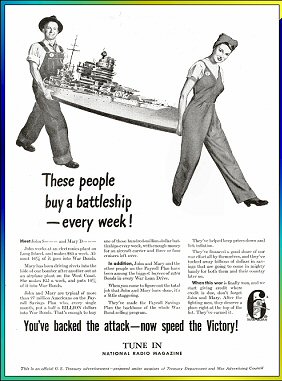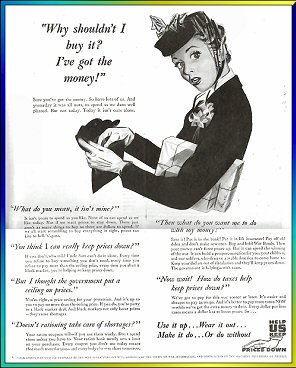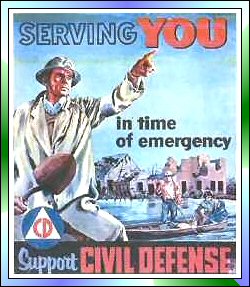Home Front
Doing Its Part
For Allied Victory
Part II
"Back the attack, buy War Bonds till it hurts..... and
then some."
--- Announcement for buying War Bonds
Lincoln, Me. (DG)---
In Part I of this series, we saw how the radio sponsors
got the message across on how the people of the Home Front could do their
part in helping the Allied forces. This article will look at the public
service announcements that also informed the listeners what to do--- and more
importantly, what NOT
to do.
With radio as a valuable means of communication, the
War Advertising Council
was created to inform the radio listeners what was expected
of them during the challenging time they lived in.
Some of the Council's
campaigns weren't very easy, but it was something that had
to be done.
One of the Council's
very first campaigns concerned "Careless Talk" (a.k.a. "Loose Lips Sink
Ships"). Although the Axis powers didn't
invade United States soil during the war, that didn't necessarily mean their
spies weren't here. In fact, the Axis did have spies in the U.S. (fortunately,
the FBI eventually captured them). Their task was to pick up any tidbit
of information from an unsuspecting American who talked more than he/she should
concerning his/her work at defense plants, letters from relatives at the war,
or anything that would help the Axis. The announcer for the
Careless Talk commercials
said it best, "The enemy has big ears, he
hopes we have big mouths. Careless Talk Costs Lives."
To the chagrin of the Axis spies, the American people didn't have big mouths---
and the Careless Talk
campaign made sure their yaps were kept in check. Instead
of vital military information, the Axis spies heard juicy gossip, dirty jokes,
and other uneventful stuff.
(a.k.a. "Loose Lips Sink
Ships"). Although the Axis powers didn't
invade United States soil during the war, that didn't necessarily mean their
spies weren't here. In fact, the Axis did have spies in the U.S. (fortunately,
the FBI eventually captured them). Their task was to pick up any tidbit
of information from an unsuspecting American who talked more than he/she should
concerning his/her work at defense plants, letters from relatives at the war,
or anything that would help the Axis. The announcer for the
Careless Talk commercials
said it best, "The enemy has big ears, he
hopes we have big mouths. Careless Talk Costs Lives."
To the chagrin of the Axis spies, the American people didn't have big mouths---
and the Careless Talk
campaign made sure their yaps were kept in check. Instead
of vital military information, the Axis spies heard juicy gossip, dirty jokes,
and other uneventful stuff.
 When
the United States entered the war, money was desperately needed for the making
of weapons and military vehicles. In order for the country to have the
money, the radio listeners were asked to invest in the country with
United States War Bonds. When
the United States entered the war, money was desperately needed for the making
of weapons and military vehicles. In order for the country to have the
money, the radio listeners were asked to invest in the country with
United States War Bonds. For the money spent, the listeners received a nice return when the
Bonds mature.
It was OK when someone bought 1 Bond,
but it definitely didn't stop there. The message on the radio was to
buy Bonds till
it hurts. In other words, buy as many
Bonds as the finances
would allow. The radio commercials were blunt, demanding, and made the
people feel a little guilty. These commercials featured sayings like
"Remember Pearl Harbor," and
messages about letting them (the troops) down when
they need us most. In a nutshell,
War Bonds was an offer
nobody could refuse--- that is, if they wanted the Allies to win the war.
No matter how many Bonds
were purchased, the commercials were specially designed
not to be satisfied. The announcer
asked the people to buy even more Bonds
if possible. As if that wasn't enough, the radio
performers took a brief time out from their programs to remind the listeners
of the latest "War Loan Drive"
being conducted--- and of course, to buy more
Bonds during that drive.
For the money spent, the listeners received a nice return when the
Bonds mature.
It was OK when someone bought 1 Bond,
but it definitely didn't stop there. The message on the radio was to
buy Bonds till
it hurts. In other words, buy as many
Bonds as the finances
would allow. The radio commercials were blunt, demanding, and made the
people feel a little guilty. These commercials featured sayings like
"Remember Pearl Harbor," and
messages about letting them (the troops) down when
they need us most. In a nutshell,
War Bonds was an offer
nobody could refuse--- that is, if they wanted the Allies to win the war.
No matter how many Bonds
were purchased, the commercials were specially designed
not to be satisfied. The announcer
asked the people to buy even more Bonds
if possible. As if that wasn't enough, the radio
performers took a brief time out from their programs to remind the listeners
of the latest "War Loan Drive"
being conducted--- and of course, to buy more
Bonds during that drive.
The rationing of food and gasoline played a big role for
the people of the home front. It wasn't exactly popular, but when some
people complained, there was a common saying back then that went like this,
"There's a war on!"
For those people who wanted more than his/her share, there was another alternative
to rationing--- unfortunately, it was also a shade on the illegal side.
This alternative was the infamous Black Market.
The War Advertising Council
immediately focused on this problem with a series of
commercials discouraging people from buying anything
through the Black Market.
The naughty people associated with the Black
Market were involved in another campaign the
War Advertising Council
conducted. This campaign was to "Keep
Prices Down." Once again, it didn't exactly
spread smiles across the kissers of the people, but it was necessary to keep
inflation in check. The announcer of the commercial asked the American
consumer to do 7 things to keep prices down. They were:
 1.) Buy only what you need. 1.) Buy only what you need.
2.)
Pay no more than ceiling prices
(stay away from the Black Market)
3.)
Support higher taxes
4.)
Pay off old debts
5.)
Don't ask for more money
6.)
Save for the future
7.)
Buy more War Bonds
With the exception of #7, the above wasn't
very appealing--- but then again, inflation wasn't very appealing, either!
One of the War Advertising
Council's most important campaigns was the
American Red Cross.
Its "War Funds" were
drives for the American people to donate money. The money the
Red Cross received
went for training nurses who went to war to help the doctors save lives.
The money also went for training the people of the home front to learn first
aid, home nursing courses, canteens, motor corps, and nurse's aide.
This training was vital, because of the possible dangers of an enemy invasion.
The Red Cross
also asked the people for a different, but extremely vital
donation during each War Fund--- blood. Collecting pints of blood for
plasma meant the difference between life and
 death to a wounded American soldier.
Like with War Bonds,
the commercials made it extremely hard for the people not to donate a
pint of blood, because they knew that pint meant life itself. death to a wounded American soldier.
Like with War Bonds,
the commercials made it extremely hard for the people not to donate a
pint of blood, because they knew that pint meant life itself.
There
were many different campaigns the War
Advertising Council informed the people
about on radio. For personal involvement, there were campaigns for
Civilian Defense (people
watching the skies for possible air invasion by the enemy), and the recruiting
of nurses, WAC's, and
WAVES. There were also
campaigns for saving and turning in used fat, rubber, paper, metal, and other
items.
These are just a few of the many campaigns the
War Advertising Council
informed the people about through radio during World War
II. When the war ended, the Council
and its campaigns didn't. Instead of contributing to
the war effort, the campaigns were designed to help people in the United States
and the post-war world. Instead of buying
War Bonds, the
announcer asked the people to buy Victory Bonds.
The money would be used to bring the victorious troops home.
From there, Victory Bonds
were known as Defense Bonds,
Security Bonds, and the name we're familiar
with today, Savings Bonds.
The Red Cross
continued to ask the people for money and blood for domestic
and worldwide emergencies. The Civilian
Defense became the
Civil Defense
 . Instead
of watching enemy planes, the CD
had trained personnel in towns & cities across the United
States. Their task was to help people in case of natural disasters. . Instead
of watching enemy planes, the CD
had trained personnel in towns & cities across the United
States. Their task was to help people in case of natural disasters.
There
was also a noticeable change with the War Advertising
Council itself. Since the war was over,
its name was shortened to the Advertising Council.
It continues its good work to this very day with different campaigns
not only within the confines of the United States, but worldwide.
The Allied troops were victorious in World War II. It was also a
victory every American man, woman, and child could share, because they knew
exactly what they had to do--- and did it. It also helped that the U.S.
had 2 powerful means of communication that got the word out quickly--- radio
and the War Advertising Council.
Author's note #2: This article was originally written and completed
on February 27, 2001. With the tragic events that occurred on September
11, 2001, I would also like to dedicate this article to all the men and women
who took part in the search and rescue at the World Trade Center, the Pentagon,
and Pennsylvania--- and to the memories of those people who lost their lives while trying to save
others.
|